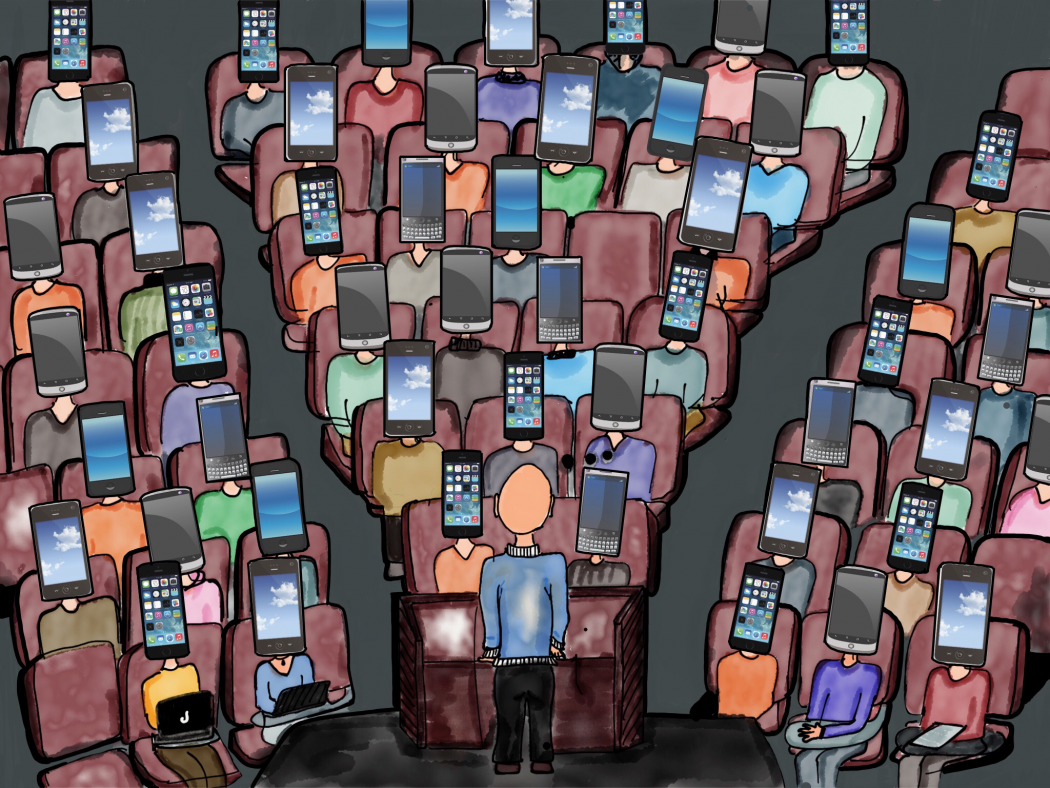In her book The Writing Life, Annie Dillard says, “How we spend our days is, of course, how we spend our lives.” What about how we start our days? The morning newspaper routine is nowhere to be found on campus; instead, students opt for Youtube clips of the previous night’s round of politically charged, satirical monologues of Fallon, Meyers, Bee, and Oliver. Rather than engaging in pages worth of news and opinions, which help fortify our own, we continually dip in the same well over and over again, rarely challenging ourselves with opposing views that make us question our own opinionated foundations. And it makes perfect sense — it is significantly easier to digest the news with laughter than having to look at another replicable talking head in corporate chic, especially if his name is Chuck Todd and has a goatee.
We live in a time where news is not only accessible everywhere, but what qualifies as news is something many in their own right struggle to define. In an era with a seemingly endless barrage of Tweets, push notifications, and CNN Breaking News Alerts (talking to you, Wolf Blitzer), we are arguably living during the apex of the 24/7 news cycle. This has, some would say, taken political journalism away from its true purpose. Rather than looking towards objective news sources and journalists in order to form an independent opinion on a given issue, this vicious 24/7 news cycle seems to lend itself to telling us what to think, rather than the other way around. While the term “fake news” is tossed around incredulously and irresponsibly by the American Commander-in-Chief, there is some truth to it, albeit in a manner dissimilar to how he would describe it. Although the news reported by CNN or MSNBC is certainly quality journalism, it is when many take political satire as absolute truth that the “fake news” moniker, to some degree, seems rather appropriate. Trying to figure out which host does the best Trump impersonation, after nearly three years of them, only takes away from the actuality of his actions.
Many students at McGill tend to fall to the left of the typical socio-political spectrum. One of the primary purposes of engaging with the media is to engage with views that differ from one’s own. This is something that tuning into the likes of, say, Jake Tapper, would help one to accomplish, as he tends to provide a fair and objective platform. Take for example Tapper’s recent interview with Broward County Sheriff Scott Israel after the Parkland Shooting that received widespread praise across the political spectrum. Ben Shapiro, far from CNN’s greatest champion, expressed his satisfaction with the interview, which was neither a premeditated malicious takedown, nor hollow journalism void of purpose. Except, the typical student is not caught sharing or liking the latest Jake Tapper trending clip on social media, but rather the latest John Oliver spoof or Trevor Noah hit-job. Don’t get me wrong, I love these satirists as much as the next person and feel they do play a role in public discourse. But when the most widely circulated sources of journalism on issues as complicated as American foreign policy are diluted to an eight-minute bit on HBO, the line between satire and news becomes fuzzy. Taken in context, these segments can play a helpful role, but when taken as the most oft-cited source of political fact, they tend to have a negative function in the discourse rather than the enlightened and humorous one they intend to play.
While the term “fake news” is tossed around incredulously and irresponsibly by the American Commander-in-Chief, there is some truth to it, albeit in a manner dissimilar to how he would describe it.
What has now materialized is news reporting on news, giving little space for viewers to develop their own views on the issues at hand. John Oliver acknowledged as much in the season premiere of Last Week Tonight. In this episode, Oliver took a tour around the world to analyze how the ways in which Donald Trump’s attacks on the media has influenced how world leaders treat their respective press corps. Due to news media’s obsession with covering their own trials and tribulations, foreign leaders often decide to bypass seasoned political journalists, preferring to speak directly to the people through social media lest their words be satirized in a way that will later be used against them.
McGill loves to brag about its sizeable international student body. However, we are missing non-American international news stories. Instead, we keep laughing about how intellectually superior we are to the typical Fox and Friends viewer, POTUS notwithstanding. Although Americans make up a plurality of McGill’s foreign students, their news attracts a disproportionate amount of our attention. The ultimate goal of university is to prepare students to enter the “real world”, but we are so distracted by the cyclone of satire, many are ignorant to even the most basic of facts about the world we will soon be leaders of. Our ignorance toward current global affairs effectively sabotages much of what university aims to do. If we continue to be distracted by Trump’s menial personal scandals that are comical simply by circumstance, we become blind to higher stakes international events that do not necessarily revolve around the US President. Moreover, if we continue to simply poke fun at the other side and use those opinions as our ammunition in a political debate, we end up hurting ourselves in the process, as the other side becomes numb to substantive facts, choosing to use the apparent bias as their main point of contention.
University is a place where, above all else, we are supposed to develop our critical thinking skills. Dumbing down the discourse to the level of the lowest common denominator, while absolutely hilarious, does little to root out the cause of the problem. While it ought to be encouraged to continue to call out the absurdity of the Alex Jones’ of the world on a daily basis, the resistance cannot simply end there.
Understandably, it’s hard for people to grasp how Donald Trump could possibly be elected. But it also can’t be easily forgotten that nearly 63 million Americans voted for him, preferring him over the seemingly obvious choice to many McGill students. Satire is a useful tool, but when it gets to the point where it causes the side being satirized to simply remain in their echo chamber, it begs the question: what is the purpose of such endeavours in the first place?
The intention of this is not to read as an anti-satire political manifesto, but rather a call to action to venture outside one’s comfort zone and to explore the way the other side thinks in order to strengthen our own views and arguments. At the end of the day, we need to stop treating the opposition as the enemy, but rather as a partner, who, if either side wants to accomplish anything worthwhile, must be better engaged with and politically invested in the pursuit of the betterment of society.








‘News reported on CNN or MSNBC is certainly quality journalism…’. Really?! By what standards? Have you looked at their abysmal ratings lately??